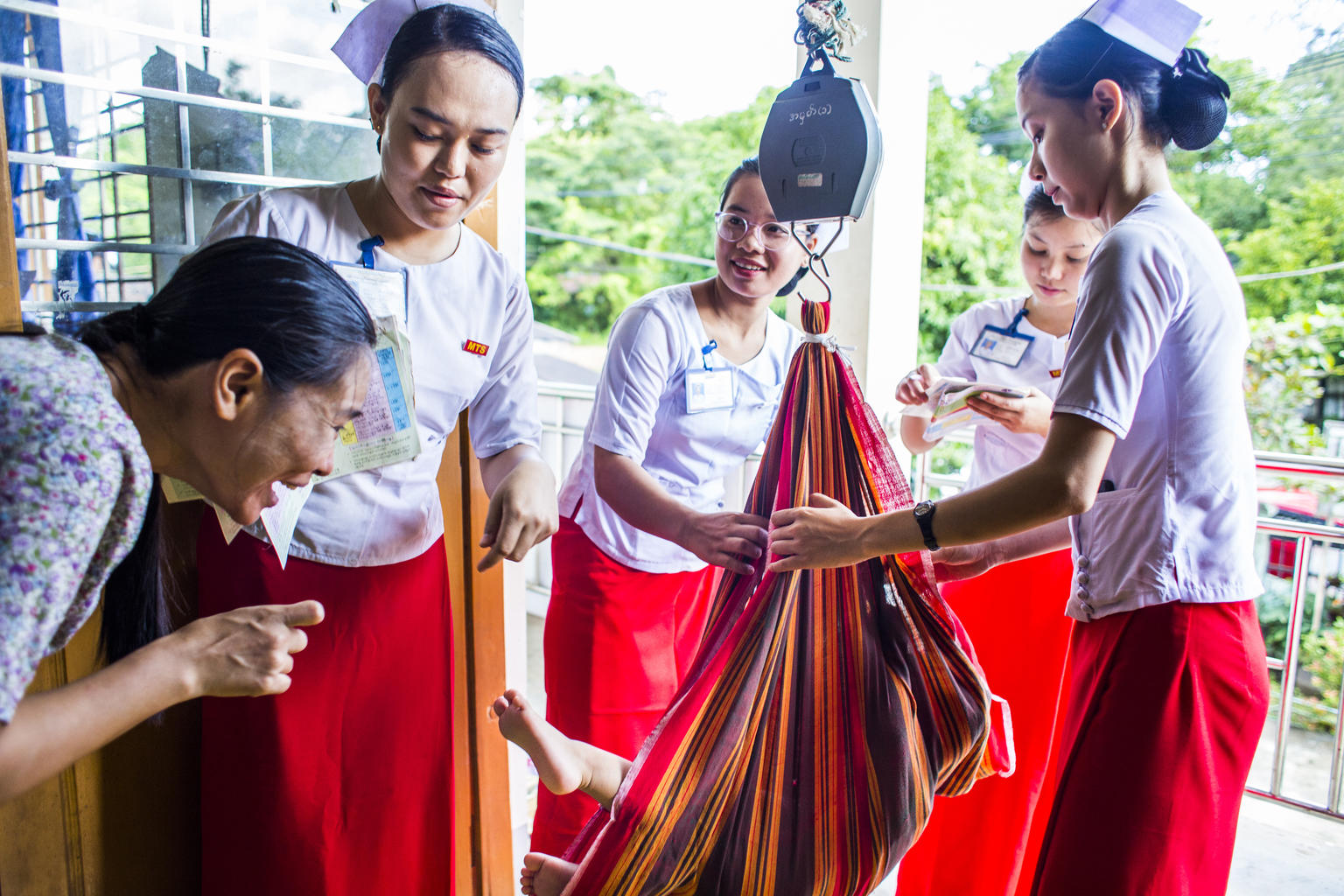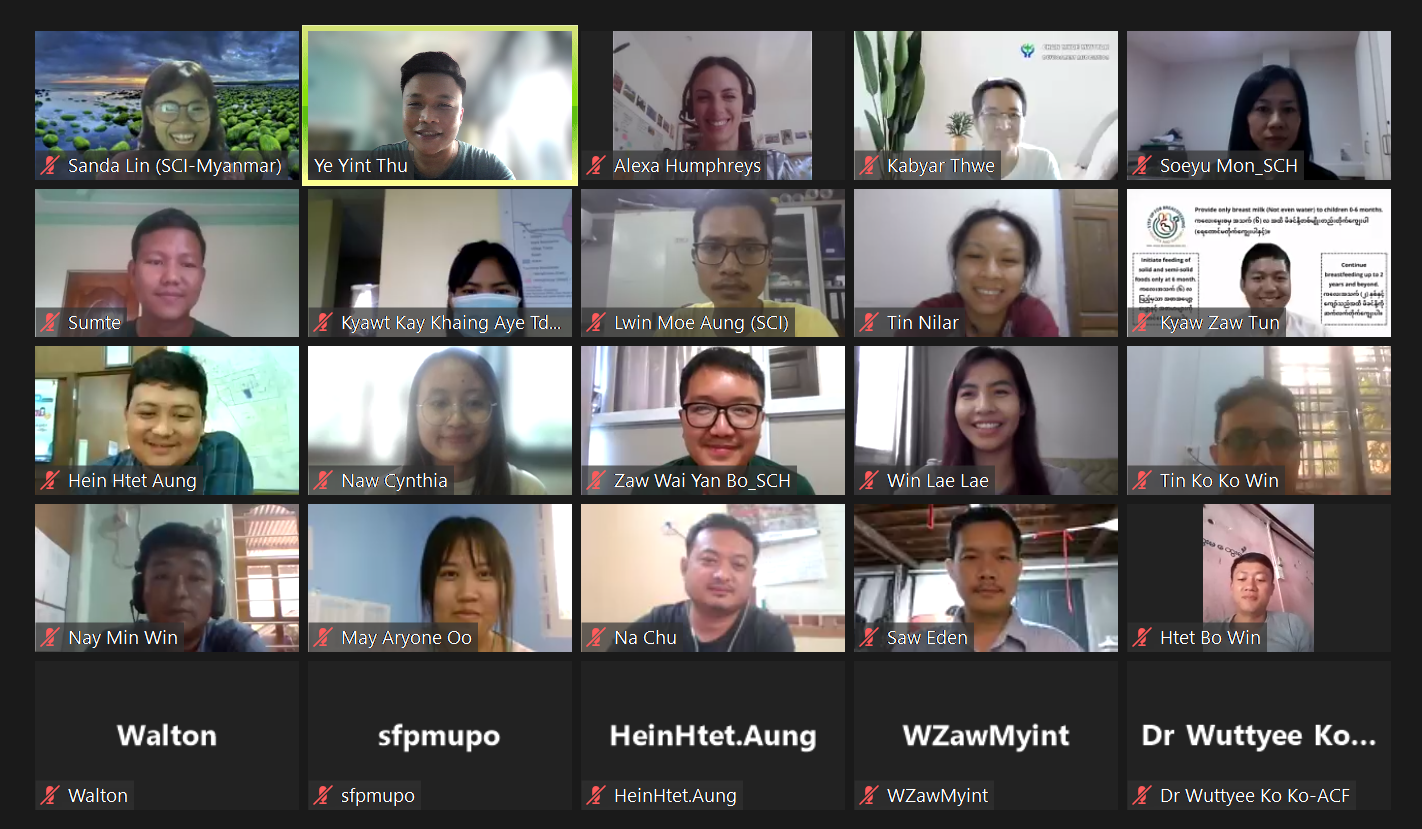Request support on coordination, information management, integration for nutrition outcomes or technical nutrition in emergencies assistance.
التماس الدعم لتنسيق التغذية وإدارة المعلومات والتغذية في حالات الطوارئ
Demander un appui pour la coordination de la nutrition, la gestion de l'information et la nutrition dans les situations d'urgence
Buscar apoyo para la coordinación de la nutrición, la gestión de la información y la nutrición en situaciones de emergencia
Solicite apoio para coordenação em nutrição, gestão de informação e nutrição em emergências
Myanmar has been in a continuous state of civil war since its independence in 1948 after 63 years of British colonization – making it the longest ongoing civil war in the world. In February 2021, the Myanmar military took over power and declared a year-long state of emergency after they were displeased with the election results. The political crisis forged the way for a humanitarian crisis as security deteriorated and COVID-19 entered the picture. Now as the crisis continues, those who were already vulnerable find themselves in greater danger while a growing number of people are in need of humanitarian assistance.
Currently, the full extent of the country’s nutritional status is largely unknown. Formal nutrition surveys and assessments are not feasible given the sensitivity around collecting and publishing nutrition data in Myanmar and their restrictive approval process for formal assessments. In fact, the most recent SMART and Demographic Health Survey (DHS) assessments were conducted in 2015-16. The next nationwide DHS survey was planned for 2021, but was postponed due to the political crisis.
In 2021, our Technical Support Team (TST) was called upon to build capacity around Nutrition Information Systems (NIS) in Myanmar. In 2022, help was requested again to provide similar support to nutrition partners in-country. Since nutrition actors were unable to carry out traditional nutrition assessments themselves due to the ongoing insecurity in Myanmar, they relied heavily on Community Health Workers to collect MUAC data for them while also screening and referring children for treatment. For that, in-country nutrition actors wanted help with scaling up MUAC screening exercises using the SMART MUAC Screening Tool and additional training so they could relay the knowledge to Community Health Workers and successfully support them at the community-level.
Harnessing contextual expertise to provide better support
Given the complexity of the context and difficulties surrounding access, the TST advocated for a more contextualized approach. The team knew that while training in English could still be beneficial, training in the local language would be much more effective.
We looked to our colleagues in-country for leadership and assembled a Myanmar Support Team that was led by Dr. Ye Yint Thu from Action Against Hunger with support from Win Lae Lae from UNICEF in Myanmar. Walton Beckley from UNICEF and our Assessment Advisor, Alexa Humphreys, provided additional, remote support. Dr. Ye and Win Lae were especially well-positioned to lead this support because they had led some sessions during the previous training in 2021 and held valuable contextual expertise of the language, intimate knowledge of the context, and existing professional connections in-country. Also, their location allowed them to be more readily available to communicate with partners in-country by phone during data collection.

The Phase I online workshop and training in Burmese focused on use of the SMART MUAC Screening Tool and how to train Community Health Workers in MUAC screening and data collection, with open sessions for discussion, collaboration, and capacity sharing. Thirty participants from both national NGOs or CSOs and international NGOs attended the training.
“I was a bit nervous to lead the training with such experienced practitioners like Alexa, Walton, Ma Win Lae and Dr. Saw Edin – and especially with our participants who are nutrition experts in Myanmar,” Dr. Ye shared. “However, I got a lot of support from my colleagues and Alexa, and we worked together to achieve a desired result.”
“I have never worked in or remotely supported Myanmar so getting to work closely with colleagues from there was a new experience for me,” shared Alexa. “I enjoyed listening in during the Phase I workshop/training and was enamored by the ebb and flow of the Burmese language. I think it is one of the most beautiful written scripts in the world.”
Win Lae from UNICEF in Myanmar who helped lead some of the training sessions said, “It was very interesting to discuss with training participants who are working in nutrition programs in different regions and to learn from their experiences and different contexts. It was a learning exercise for me as well.”

Walton also from UNICEF added, “It was great to observe the commitment and genuine interest of the participants. It is obvious that with adequate capacity building, they will be in a good position to improve on the existing information dearth.”
Following the training, partners were encouraged to cascade the learnings to their own Phase II trainings of Community Health Workers in their areas. They then either collected new MUAC data or submit recent MUAC data using the SMART MUAC screening tool, which the team helped to analyze and interpret. In total, data from 23 screening exercises were submitted which contributed to the understanding of the nutrition situation in those areas.
Ultimately, this support was meaningful and sustainable as it increased the confidence of the Assessment and Information Management Technical Working Group (AIM TWG) to coordinate such screening activities in the future while strengthening the capacity of partners on the use of the SMART MUAC screening tool.
Lessons Learned
As we expected, conducting the workshop and training in Burmese created a more engaging and contextualized experience for participants. It also ensured more consistent information was being passed down to Community Health Workers and that in-country colleagues could more easily support one another if they needed technical support or had questions during data collection.
Also as expected, with national colleagues leading the support, participants took more ownership over the exercise and the results from the training proved more sustainable.
Some of the difficulties, however, included translating the training materials into Burmese – a script that is not available on all computers and can be a labor intensive process. It was decided to keep the training materials – such as slide decks – in English when they would only be used for the Phase I training and workshop participants, while translating all materials that would be used to train Community Health Workers into Burmese.
We were also reminded that when coordinating a large multi-partner exercise, it is important to exhaust all communication channels to reach relevant actors – especially those who do not communicate closely with the Nutrition Cluster – so that no actor who could directly benefit from the support is left behind.
--------------------------------------------------
The GNC Technical Alliance is excited to continue supporting practitioners through this contextualized approach more routinely, given its numerous benefits.
If you and/or your team could benefit from such support, our Technical Support Team of nutrition advisors and experts are ready to answer your questions and support you in-country or remotely. Get in touch with us.
